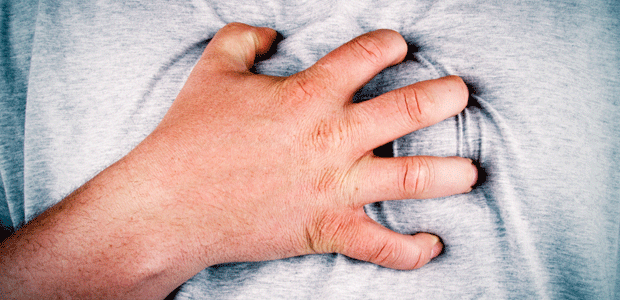Advertisement
Heart Attack or Heartburn?
Knowing the difference

My early training as a doctor was in Emergency Medicine, and we often weren’t sure whether a patient was suffering from heart symptoms or simply heartburn. Even if tests ruled out a heart attack as the cause of chest pain, there still could be a problem with the patient’s heart.
So we’d call in a favourite friend, called the Pink Lady, to help us. This cocktail, a liquid mix of antacid and an anaesthetic, usually lidocaine, helped us determine whether the patient’s chest pain came from their digestive system or their heart. If the patient felt better after taking the mixture, we thought we could safely assume their symptoms were heartburn or some other stomach problem. Unfortunately, research has since shown that some heart patients feel better after drinking this concoction, so the Pink Lady is no longer recommended.
Differentiating between a heart attack, caused by a blockage of the arteries that feed your heart, and heartburn, caused by excess stomach acid washing up into your esophagus, isn’t always easy, even for health practitioners. In many cases, however, you can tell the difference between the two, and knowing how might just save your life.
With both a heart attack and heartburn, you may feel burning or pressure behind your sternum, (also known as the breastbone), the flat bone in the centre of your chest. Because the heart is in the left chest, many assume that a heart attack would announce itself on that side. Not so. Those experiencing a heart attack classically feel pain in the centre of their breastbone or across their entire chest as a result of the way their nerves are wired.
Serious symptoms of a heart attack
Sudden tightening, squeezing, or crushing chest pain
If someone is describing chest discomfort to me, I’ll ask if they feel significant pressure, tightness, or the sensation of an elephant sitting on their chest. If you have any of these symptoms, there’s an increased likelihood that what you’re feeling is from your heart. If it’s sudden and severe, take it seriously and act quickly by calling 911 or the emergency number in your area.
Pain radiating up into your neck, jaw, shoulders, or into your left arm
Pain from heartburn normally limits itself to the centre of the chest. If pain radiates elsewhere, your heart could be the source. I’ve seen patients with early heart attacks complain of pressure in the chest accompanied by a vague ache in the neck or jaw. They often don’t mention the latter unless I ask very specific questions to uncover these important details.
Pain that comes on while you’re exercising or exerting yourself
Heartburn usually follows a meal and lying down or bending over makes it worse. Unless you’re exercising after a big meal, exertion shouldn’t trigger heartburn. If you get chest pain, burning, squeezing, or pressure when you walk briskly or climb stairs, your health practitioner needs to know. This pain, known as angina, is a signal that you have a blockage in the arteries to your heart and could mean that a serious heart attack is around the corner. Stress can also bring on angina by stimulating your heart through fight-or-flight hormones. If you get this type of discomfort that doesn’t subside after a few minutes, seek urgent medical attention.
Feeling breathless, sweaty or dizzy
If you feel unwell, light-headed, fatigued, have trouble breathing, or are clammy with perspiration, something serious is likely going on.
As I’ve indicated, if you even slightly suspect that your symptoms are heart related, you must get medical attention as soon as possible. If your symptoms are mild and you can’t get in touch with your health practitioner, go to an extended-hours clinic and let them know immediately that you’re experiencing chest pain. If your symptoms are significant, particularly if the pain or pressure is severe and doesn’t settle down, call 911 or the emergency number in your area. Never drive yourself. If your pain becomes a full-on heart attack while you’re at the wheel, it could be disastrous.
Also, if you think you’re having angina or a heart attack, take an Aspirin. It reduces the risk of blood clots and can protect you from more severe injury to your heart. While waiting for the ambulance, I always give an Aspirin to patients who I suspect of having heart trouble.
Heading off heartburn
If it turns out you have heartburn, there are many things you can do to prevent it. Eat smaller meals, avoid lying down after a meal, and avoid heartburn-promoting foods such as alcohol, chocolate, coffee, fatty foods, citrus juices, tomato sauces, pop, vinegar, and—believe it or not—peppermint tea. Peppermint relaxes the ring of muscle that protects your esophagus from stomach acid, making you more vulnerable to heartburn.
If you’re overweight, work on slimming down. The excess pounds put pressure on your stomach and cause acid to back up into the esophagus. Avoid tight-fitting clothes for the same reason. If you get mild symptoms from time to time, an over-the-counter antacid may provide relief, as can stress-reduction techniques. If you experience heartburn frequently, see your health practitioner.
You can also do much to prevent heart disease and eventual heart attacks. The top risk factors associated with heart disease include smoking, diabetes, high blood pressure, increased cholesterol, and a strong family history.
You can minimize your risk through a heart-healthy lifestyle: exercise regularly; minimize stress; eat plenty of fruits, vegetables, and fibre; avoid trans fats; get regular health checkups; and maintain a healthy weight. Heart-healthy superfoods include the omega-3 fatty acids found in olive oil, red wine, and fatty fish such as salmon. Each of these lifestyle actions will also help you prevent or even treat diabetes and high blood pressure and cholesterol.




